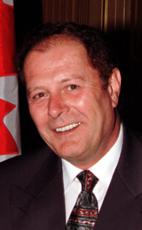Mr. Speaker, it gives me pleasure to rise to speak to Bill C-2. However, before I do, I want to commend my colleague from North Vancouver who has done a tremendous amount of work on the bill. He has researched it at length and has come up with very serious flaws in the bill. It needs to be completely rejigged.
As my colleague, who just spoke before me, said, it is weighted to the governing side, in this case the Liberals but it could be another government at another time. What we want is a neutral act, an act that is fair to all sides of the House and to all people in an election.
It does not have the support of the public at the moment. It does not have the support of the Chief Electoral Officer. It does not have the support of all the members in the House. I believe that is critical. As I said earlier, we need to have a neutral bill, a bill that all people, including the Chief Electoral Officer, support. A neutral bill just makes common sense. We are talking about a 19th century bill when we are in the 21st century. It is bizarre that the government would want this. It shows that it is still a dinosaur trying to practise old style politics.
The committee should have travelled throughout Canada and people should have been able to talk to the government and opposition parties about the bill but that did not happen.
As my colleague has said, there are a number of areas of major concern: campaign financing, party registration requirements, timing of byelections. These are all up for grabs. Basically, they all weigh on the side of the government, and that is clearly wrong.
The courts have already struck down a number of points that are in the bill. Why would we have points within a bill that we know the courts will reject? That is ridiculous.
We have already had groups come forward saying that this was ridiculous. The National Citizens' Coalition has said “We're going to challenge it”. It will be challenged. Why would we spend our effort in the House producing a bill that is not up to speed and one which we know will be challenged in court? Not only do we know it will be challenged, we also know it will lose. This is nuts.
One of the points I would like to talk about is the blackout poll. It is certain to be struck down. Court decisions have already said that it will not fly. They have already made rulings on it yet the government insists on putting this part of it in the bill. Why would it do that?
Then there is the registered party status requirement of 50 candidates. That is crazy. Two or three candidates should be enough, or pick a number such as a dozen. Most people are ready for 12. That is reasonable. Again the government is trying to force the playing field away from the average ordinary Canadian.
On the spending limits, think about the dollars the Liberals have in their pockets. I believe the last figure was $30 million that they can spend on campaigns. They want to limit third party intervention, whether it be from police officers on justice issues, or from health care professionals, nurses and doctors, on our health program which we know is in trouble. At election time, these people through their organizations want to put their points forward, yet the government is saying “We do not want to have third party intervention because it will be against us”. Again the government is trying to limit it.
And there is the actual machinery of running an election. Each of the 301 ridings has a returning officer. Returning officers should be appointed on merit; they should not be political appointments. There have been a number of situations where persons are either biased or just incompetent, not good at their jobs. We want the best returning officers we can have. The Chief Electoral Officer is there to make sure that the election machinery is run well, is fair and the results are credible. Bill C-2 does everything to fly in the face of that.
Something which is not in the bill is fixed election dates. That needs to be explored. Nobody is saying that the U.S. is perfect but it does have fixed election dates. It is known that four years down the road there will be an election for president in November.
In our country the governing party, whoever happens to be in power at the time, weighs all the situations and does the polls to see when the wind is in its favour to call an election. That is wrong. An election should be held as municipal elections are, on fixed dates, so we all know when the next election will be.
There are glaring points in the bill, issues such as the courts already striking down sections of the bill. We know it will not pass. We know it will be challenged and rejected in the courts. Why would it be put in the bill? It is folly. We want a neutral bill.
I hope the bill can be redrafted to the point where it is a neutral bill and does not favour any party but favours all Canadians. In that way our party would be able to support the bill. The way it is now there is no way in the world we can support it.

